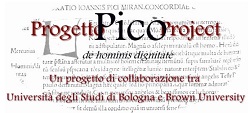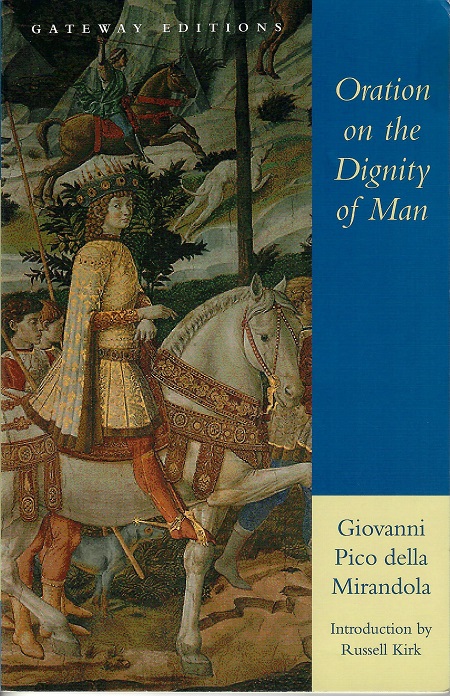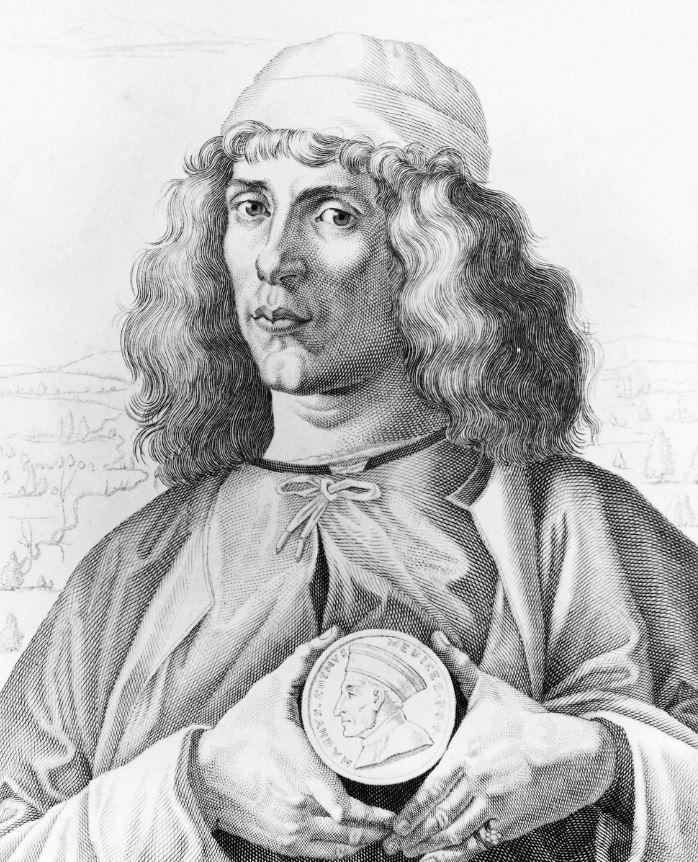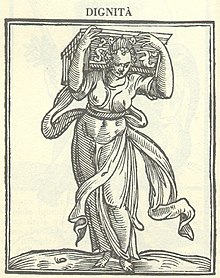The Discourse on the Dignity of Man (1486) by Pico della Mirandola (1463-1494) is considered the “Manifesto of the Renaissance.” Indeed, it exalts the human creature for his/her freedom and capacity to know and to dominate reality as a whole. Far from being simply that, however, the Discourse deals with the vocation of the human creature who, possessing no determinate image, is urged to pursue its own perfection. Such a pursuit begins with moral self-discipline, passes through the familiar, multifarious world of images and fields of knowledge, and strives toward that most lofty goal which defies representation. Pico believes that this paradigm, by virtue of the fact that it is to be found in every tradition, is universal.
The Discourse merits attention today precisely on account of its affirmation that human nature, which is in itself indeterminate and weak, comes alive and obtains its identity through the plurality of human cultures, each representing customs that, though distinct, are (in their essence, structure and function) essentially identical. Hence the possibility of harmony and grounds for “peace” among cultures.



Oration on the Dignity of Man, pp. 25-29
 The dignity of the liberal arts, which I am about to discuss, and their value to us is attested not only by the Mosaic and Christian mysteries but also by the theologies of the most ancient times. What else is to be understood by the stages through which the initiates must pass in the mysteries of the Greeks? These initiates, after being purified by the arts which we might call expiatory, moral philosophy and dialectic, were granted admission to the mysteries. What could such admission mean but the interpretation of occult nature by means of philosophy? Only after they had been prepared in this way did they receive “Epopteia” that is, the immediate vision of divine things by the light of theology.
The dignity of the liberal arts, which I am about to discuss, and their value to us is attested not only by the Mosaic and Christian mysteries but also by the theologies of the most ancient times. What else is to be understood by the stages through which the initiates must pass in the mysteries of the Greeks? These initiates, after being purified by the arts which we might call expiatory, moral philosophy and dialectic, were granted admission to the mysteries. What could such admission mean but the interpretation of occult nature by means of philosophy? Only after they had been prepared in this way did they receive “Epopteia” that is, the immediate vision of divine things by the light of theology.
Who would not long to be admitted to such mysteries? Who would not desire, putting all human con cerns behind him, holding the goods of fortune in contempt and little minding the goods of the body, thus to become, while still a denizen of earth, a guest at the table of the gods, and, drunk with the nectar of eternity, receive, while still a mortal, the gift of immortality? Who would not wish to be so inspired by those Socratic frenzies which Plato sings in the Phaedrus,19 that, swiftly fleeing this place, that is, this world fixed in evil, by the oars, so to say, both of feet and wings, he might reach the heavenly Jerusalem by the swiftest course? Let us be driven, Oh Fathers, by those Socratic frenzies which lift us to such ecstasy that our intellects and our very selves are united to God. And we shall be moved by them in this way if previously we have done all that it lies in us to do.
If, by moral philosophy, the power of our passions shall have been restrained by proper controls so that they achieve harmonious accord; and if, by dialectic, our reason shall have progressed by an ordered advance, then, smitten by the frenzy of the Muses, we shall hear the harmony with the inward ears of the spirit. Then the leader of the Muses, Bacchus, revealing to us in our moments of philosophy, through his mysteries, that is, the visible signs of nature, the invisible things of God,20 will make us drunk with the richness of the house of God; and there, if, like Moses, we shall prove entirely faithful, most sacred theology will supervene to inspire us with redoubled ecstasy. For, raised to the most eminent height of theology, whence we shall be able to measure with the rod of indivisible eternity all things that are and that have been; and, grasping the primordial beauty of things, like the seers of Phoebus, we shall become the winged lovers of theology. And at last, smitten by the ineffable love as by a sting, and, like the Seraphim, born outside ourselves, filled with the godhead, we shall be, no longer ourselves, but the very One who made us.
The sacred names of Apollo, to anyone who penetrates their meanings and the mysteries they conceal, clearly show that God is a philosopher no less than a seer; but since Ammonius has amply treated this theme, there is no occasion for me to expound it anew. Nevertheless, Oh Fathers, we cannot fail to recall those three Delphic precepts which are so very necessary for everyone about to enter the most holy and august temple, not of the false, but of the true Apollo who illumines every soul as it enters this world.21 You will see that they exhort us to nothing else but to embrace with all our powers this tripartite philosophy which we are now discussing. As a matter of fact that aphorism: ![]()
that is: “Nothing too much,” duly prescribes a measure and rule for all the virtues through the concept of the “Mean” of which moral philosophy treats. In like manner, that other aphorism ![]()
that is, “Know thyself,” invites and exhorts us to the study of the whole nature of which the nature of man is the connecting link and the “mixed potion”; for he who knows himself knows all things in himself, as Zoroaster first and after him Plato, in the
Alcibiades, wrote.22 Finally, enlightened by this knowledge, through the aid of natural philosophy, being already close to God, employing the theological salutation ![]()
that is “Thou art,” we shall blissfully address the true Apollo on intimate terms.
19. Plato, Phaedrus 245b
20. Recalls Rom. 1:20
21. Reminiscent of John 1;9
§ 20.
109. In fact, however, not only the Mosaic and Christian mysteries,1 but also the theology of the ancients2 show us the dignity and value of the liberal arts which I am about to discuss.
110. For at what else was the observance of the different degrees of initiation in Greek mysteries aimed? Only after having been purified through the arts which we might call expiatory, moral philosophy and dialectic,3 the initiates could gain entrance to the mysteries.4
111. And what else can such admission possibly signify if not an interpretation by means of philosophy of the most hidden nature?
112. At this point they were finally prepared for the coming of ![]() ,5 that is the intimate vision of divine things by the light of theology.
,5 that is the intimate vision of divine things by the light of theology.
113. Who would not long to be initiated into such sacred rites?
114. Who would not desire, putting aside all human concerns, despising the goods of fortune and neglecting the body, to become a guest at the table of the gods while still living on earth, and, soaked in the nectar of eternity, to receive, though still a mortal animal, the gift of immortality?
115. Who would not wish to be so inspired by the Socratic frenzies that Plato celebrates in the Phaedrus, that he is transferred after a quick course, fleeing readily with oarlike strokes of wings and feet, from here (that is, from this world set on evil) to the heavenly Jerusalem?
116. We shall be led away, Fathers, we shall be led away by the Socratic frenzies,6 which will so lift us out of our mind as to put our mind and ourselves in God.
117. We shall be led away by them, however, only if we ourselves first complete that which is ours to do; for, if through moral philosophy the forces of our passions have been correctly attuned, in the correct proportions, based on harmonic measure, so as to be tuned one to the other in lasting consonance; and if, through dialectic, our reason has progressed by measured advance, only then, stirred by the frenzy of the Muses, we shall drink the heavenly harmony with our inmost hearing.
118. Then Bacchus, the leader of the Muses,7 through his mysteries (that is, through the visible signs of nature) will show us, who philosophize, the invisible things of God, and will make us drunk with the abundance of God’s house, in which, if we prove entirely faithful, like Moses, most sacred theology shall draw close to us, animating us with redoubled frenzy.
119. For we, raised to her most eminent height, thence comparing to indivisible eternity all things that are and shall be and have been and admiring their primeval beauty, shall be the Phoebean seers; of this beauty we shall become the winged lovers. And at last, roused by ineffable love as if by a sting, and borne outside ourselves like burning Seraphim, filled with the godhead, we shall be no longer ourselves, but He Himself Who made us.
§ 21.
120. The sacred names of Apollo, if anyone investigates their meanings and hidden mysteries, sufficiently show that that God is, no less than a seer, a philosopher.
121. But since Ammonius8 has amply examined this matter, there is no reason for me to treat it further; but, Fathers, let us recall the three Delphic precepts,9 which are absolutely necessary to those who are to enter the most holy and august temple, not of the false, but of the true Apollo who lighteth every soul that cometh into this world; you will realize that they exhort us to nothing else but to embrace with all our strength the tripartite philosophy that we now discuss.
122. For the famous maxim, ![]() (that is: «Nothing too much»), rightly prescribes as rule and norm for every virtue the criterion of the “mean”, of which moral philosophy speaks.
(that is: «Nothing too much»), rightly prescribes as rule and norm for every virtue the criterion of the “mean”, of which moral philosophy speaks.
123. Then the maxim, ![]() (that is: «Know thyself»), urges and exhorts us to the knowledge of all nature, of which the nature of man is the intermediate and, so to speak, the mixture.
(that is: «Know thyself»), urges and exhorts us to the knowledge of all nature, of which the nature of man is the intermediate and, so to speak, the mixture.
124. For he who knows himself, in himself knows all things, as first Zoroaster wrote, and later Plato in the Alcibiades.
125. Finally, once natural philosophy has enlightened us with this knowledge, and we, being very close to God and saying ![]() (that is: «You are»), we shall address by a theological salutation the true Apollo on intimate and likewise blissful terms.
(that is: «You are»), we shall address by a theological salutation the true Apollo on intimate and likewise blissful terms.
Count Giovanni Pico della Mirandola (February 24, 1463 – November 17, 1494) was an Italian Renaissance philosopher.
~Giovanni Pico della Mirandola- Oration on the dignity of man~
He is famed for the events of 1486, when at the age of 23, he proposed to defend 900 theses on religion, philosophy, natural philosophy and magic against all comers, for which he wrote the famous Oration on the Dignity of Man which has been called the “Manifesto of the Renaissance” manifest meaning to provide evidence for or to stand as proof. Renaissance means to be born again so he meant that man was being reborn again.
Pico based his ideas chiefly on Plato, as did his teacher, Marsilio Ficino, but Pico retained a deep respect for Aristotle. Although he was a product of the studia humanitatis (human study), Pico was constitutionally an eclectic,(made up of what is selected from different sources) and in some respects he represented a reaction against the exaggerations of pure humanism.
He wrote works that among other things refuted (went against or ignored) the use of astrology and tried to reconcile the differences between Platonic and Aristotelian philosophy.
In the “De hominis dignitate” Pico justified the importance of the human quest for knowledge within a neo-Platonic framework. The Oration also served as an introduction to Pico’s 900 theses, which he believed to provide a complete and sufficient basis for the discovery of all knowledge, and hence a model for mankind’s ascent of the chain of being.
Alchemy-any magical power or process of transmuting a common substance, usually of little value, into a substance of great value.
Neoplatonism: As a form of mysticism, it contains theoretical and practical parts, the first dealing with the high origin of the human soul showing how it has departed from its first estate, and the second showing the way by which the soul may again return to the Eternal and Supreme.
The primeval Source of Being is the One and the Infinite, as opposed to the many and the finite. It is the source of all life, and therefore absolute causality and the only real existence. However, the important feature of it is that it is beyond all Being, although the source of it.
Therefore, it cannot be known through reasoning or understanding, since only what is part of Being can be thus known according to Plato. Being beyond existence, it is the most real reality, source of less real things. It is, moreover, the Good, insofar as all finite things have their purpose in it, and ought to flow back to it.
But one cannot attach moral attributes to the original Source of Being itself, because these would imply limitation. It has no attributes of any kind; it is being without magnitude, without life, without thought; in strict propriety, indeed, we ought not to speak of it as existing; it is “above existence,” “above goodness.”
Della Mirandola spoke in front of hostile clerics of the dignity of the liberal arts and of the dignity and glory of angels. He said that a man should emulate the dignity and glory of the angels by “exercising philosophy.” Pico della Mirandola said a man, if he cultivates what is rational, “will reveal himself a heavenly being; if intellectual, he will be an angel and the son of God.” Pico della Mirandola said a philosopher “is a creature of Heaven and not of earth.”
When man philosophizes, he ascends the chain of being towards the angels, and communion with God. When he fails to exercise his intellect, he vegetates. Pico did not fail to notice that this system made philosophers like himself among the most dignified human creatures.
The root of this dignity lay in his assertion that only human beings could change themselves through their own free will, whereas all other changes in nature were the result of some outside force acting on whatever it is that undergoes change. He observed from history that philosophies and institutions were always in change, making man’s capacity for self-transformation the only constant.
Coupled with his belief that all of creation constitutes a symbolic reflection of the divinity of God, Pico’s philosophies had a profound influence on the arts, helping to elevate writers and painters from their medieval role as mere artisans to the Renaissance ideal of the artist as genius.
~Giovanni Pico della Mirandola- Oration on the dignity of man~